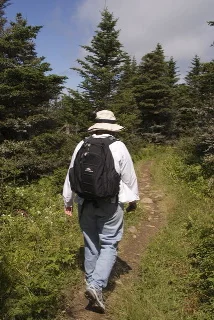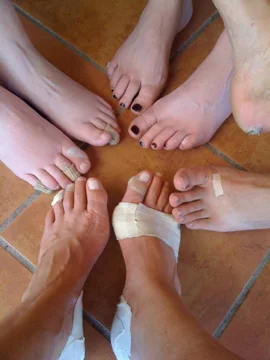Same Path, Different Journey
Emily shares her perspective this week:
I have been thinking lately about some people for whom I pray, the men and women who contribute to the online support groups for spouses of people with FTD. Most of them are dealing with husbands with Behavioral Variant FTD (bvFTD) — look it up and count your blessings — and I confess I am thankful I am not doing that. I also am aware that I very well may be dealing with it some day — FTD can morph into all sorts of things — and therefore am grateful for their insights and teachings.
One young woman recently posted that she will be interviewed by “60 Minutes” about her life with four children under age seven and a husband with bvFTD who now is in a nursing facility an hour away. I have followed her posts for several months and am just plain in awe of her resilience, strength and humor, even on the bad days. Tracey and I are also being interviewed by “60 Minutes,” and in comparison, I feel somewhat unworthy. Tracey is in an early stage of Primary Progressive Aphasia (PPA), a variant of FTD that erodes language and executive function. Yes there are days of confusion, wordlessness and meltdowns, but we are still a team, a couple, able to publicly talk about dementia in front of lots of people. Most of the people in the support forums are farther down this path than we are.
I have seen a couple of posts recently from people whose spouses, like Tracey, have PPA. They want to talk to others undergoing a similar experience. Their posts seem almost diffident, not wanting to offend anyone whose life with bvFTD is so blatantly, tragically upside down. But these spouses need support with a different problem — a partner who shares many of the same challenges but cannot communicate them. Quieter, but no less devastating. No matter the variant, this disease is a bitch.
I am reminded of walking the Camino de Santiago de Compostela in Spain, where we encountered among pilgrims a one-upmanship of “you aren’t really on the True Camino unless you are schlepping your own backpack and staying in smelly albergues with dozens of snoring people every night.” Those of us who stayed in places with private bathrooms sometimes felt inferior, whether or not our fellow travelers intended it. And most of them did not. But as I learned, left foot, right foot, across 321 miles on the Camino, we each walk our own road and learn our own lessons. Although we walk on the same path and endure the same aches and blisters, each of us is on our own particular journey.
At The Association for Frontotemporal Degeneration (AFTD) annual conference, there usually is a contingent of people who have bvFTD. Theirs is a different, sometimes frenetic energy. Even though most of them are determined, capable and self-controlled, to an outside observer, there is still something off kilter about them. I remember a breakout group last year that was run by two people with bvFTD who had obviously worked hard to put together a presentation about dealing with the disease firsthand. It was excellent, but they did not get through even half of it. Between their own sidetracking and audience comments that hijacked the discussion, the conversation went around in circles until I thought I was losing my mind. Tracey had to leave the room. If one’s problem is language, so that just forming a sentence takes real muscular energy, and if one’s brain is so easily muddled that one has to become borderline OCD in order to exert some control over any part of life, then few things are quite so discombobulating as a room full of boisterous, unfiltered, free-associating people. Same path, different journey.
Walking the Camino, we met people who were there for very different reasons: the 17-year-old German boy who was walking in preparation for joining the priesthood; the Swedish couple who met somewhere on the Camino every year for their annual affair; the Austrian who had just broken up with his long-time partner and then lost his job and was walking to get some space and insight about it all; the Irish family vacationing with their two young children who came around the corner just at the unfortunate moment I was telling Tracey (loudly) what she could do with the f-ing backpack on the f-ing Camino for the rest of her f-ing life; the Germans who had just read Hape Kerkeling’s very funny book about his Camino (Ich bin dann mal weg, or the English version, I’m Off Then) and wanted to join in the fun. So many of us walking outward but focused inward. I recall entire days when I greeted people, even walked along and talked with them, but never got out of my own head. Someday I would like to walk it again, slowly and deliberately, really thinking about all of us on that same road together.
And so I read the FTD support group Facebook posts and talk with people at forums and workshops and I learn from each of them. Sometimes I think, there but for the grace of God, and I have NO problems. None. Other times I think, well, I have experience of that and can offer some support and advice, or just support and commiseration and so I chime in. And sometimes I think, gee I hope this person will be there when Tracey starts doing that so I can ask her advice. When, not if. And I do pray for them all, and for some of them by name, especially the woman who also will be on “60 Minutes.”


